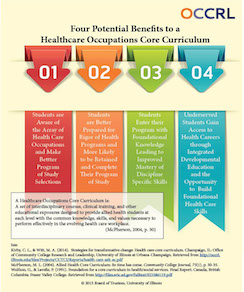For over 20 years there has been a call for integrated and cross-professional education across health professions education focused on building a foundational set of shared competencies (Pew, 1995). The health occupations core curriculum implemented by the Health Professions Pathway Consortium (H2P), puts this idea into practice. Advocates of the core curriculum argue that it has benefits for the students, the college, and the health industry. Students are more aware of their career options, better prepared for rigorous coursework, and have improved master of discipline specific skills (McPherson, 2004; Wolfson & Lavelle, 1991). College’s attract a more diverse student population, and have higher retention, completion and graduate employment rates (McPherson, 2004). Industry benefits from having a more diverse workforce who are more proficient and skilled employees (Wolfson & Lavelle, 1991).
El Centro College, with over 10 years of experience in developing and implementing a competency-based core curriculum, led H2P’s implementation of the core curriculum. The H2P Consortium capitalized on El Centro College’s expertise with curriculum reform, and invited El Centro College personnel to lead a community of practice to provide a wide array of technical assistance and mentoring to colleges in and outside of the H2P Consortium. Across the consortium, 20 new courses were developed and 20 existing courses were enhanced as each college developed its own customized core curriculum. In the course of the first three years, H2P’s Core served over 2200 students.
From its initiation, the H2P consortium set out to galvanize a national movement to improve healthcare education and training with core curriculum as a central strategy of this work. As of July 2015, H2P had grown its commitment to the core curriculum from its nine colleges to a total of 33 colleges, each who had signed a commitment to implementing a core curriculum at their college.
Wondering if your students could benefit from a competency-based core curriculum, in healthcare or in another discipline? Listen to Sondra Flemming from El Centro College describe the process and its results in the Health Professions Pathways, Voices for Transformative Change Podcastand read about the Health Care Core Curriculum, Strategies for Transformative Change brief.
References
- McPherson, M. L. (2004). Allied Health Core Curriculum: Its time has come. Community College Journal, 75(1), p. 30-35.
- Pew Health Professions Commission. (1995). Critical challenges: Revitalizing the health professions for the twenty-first century. San Francisco, CA: University of California San Francisco, Center for the Health Professions.
- Wolfson, G., & Lavelle, P. (1991). Foundation for a core curriculum in health/social services. Final Report. Canada, British Columbia: Fraser Valley College.
Heather L. Fox is a project coordinator for OCCRL. Heather is passionate about supporting community college efforts to provide students with equitable and high quality career pathways.
